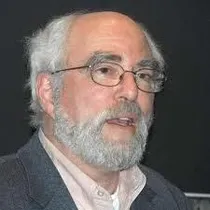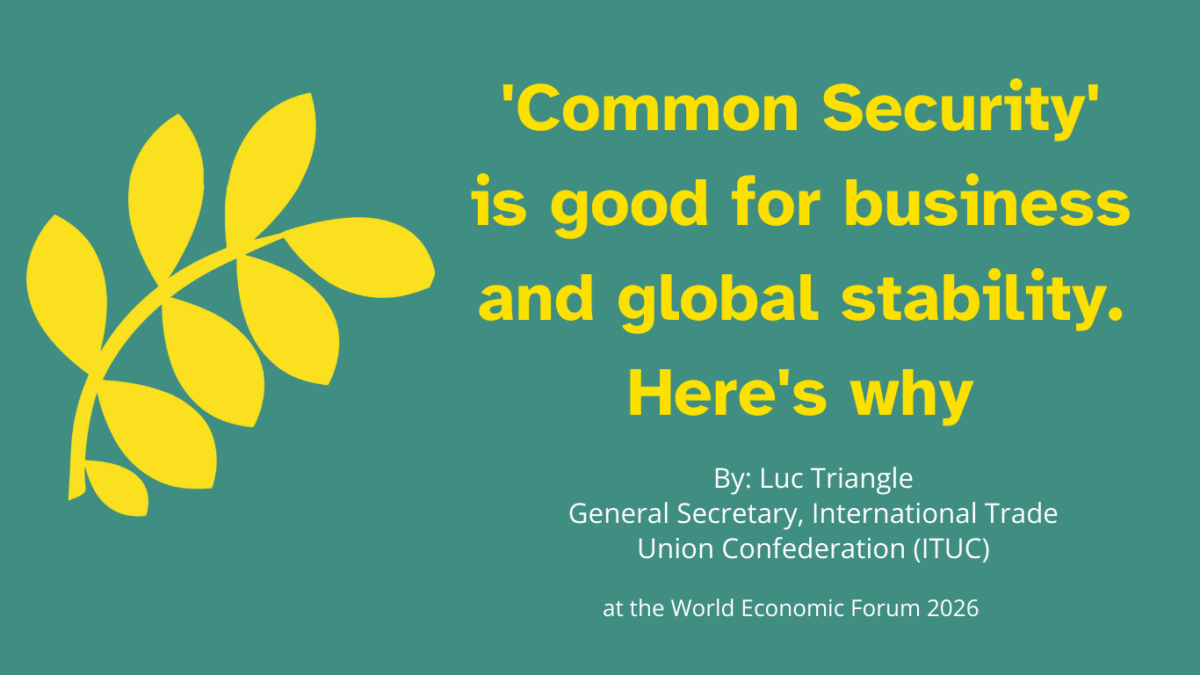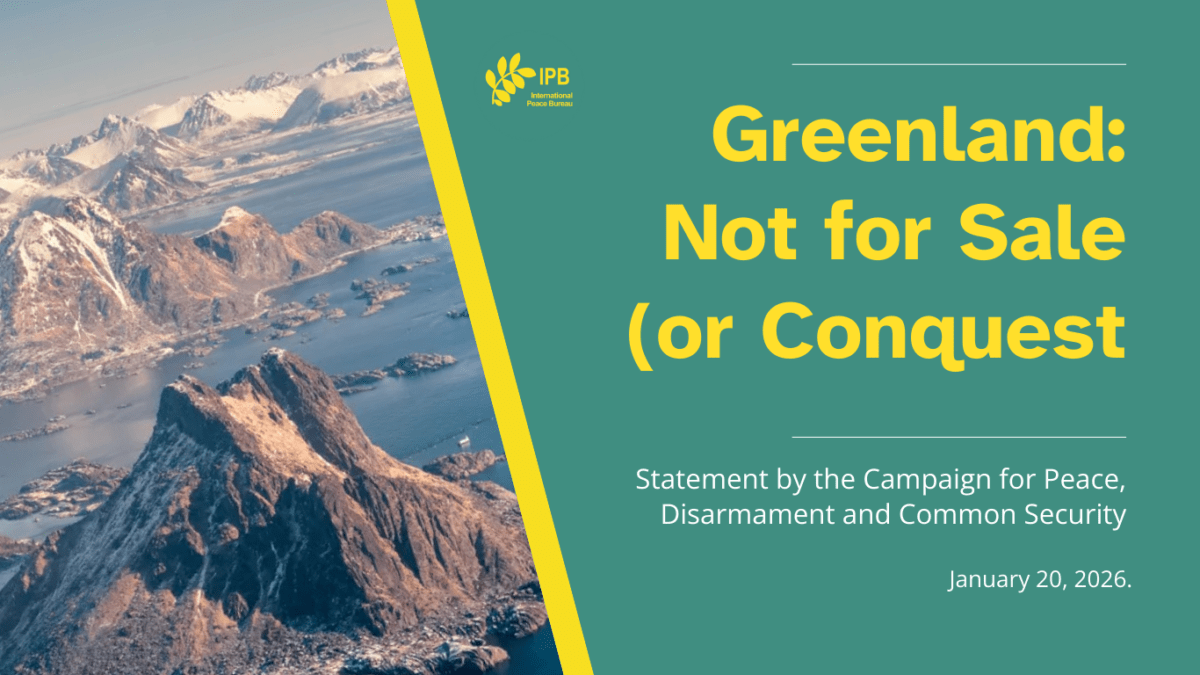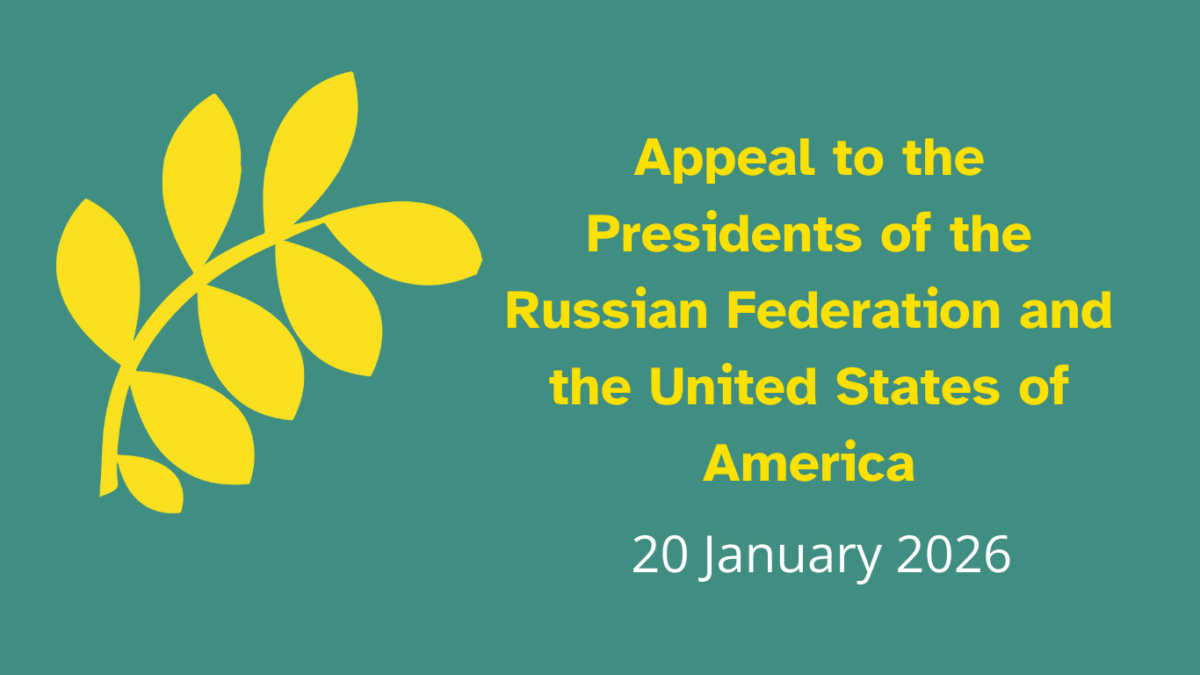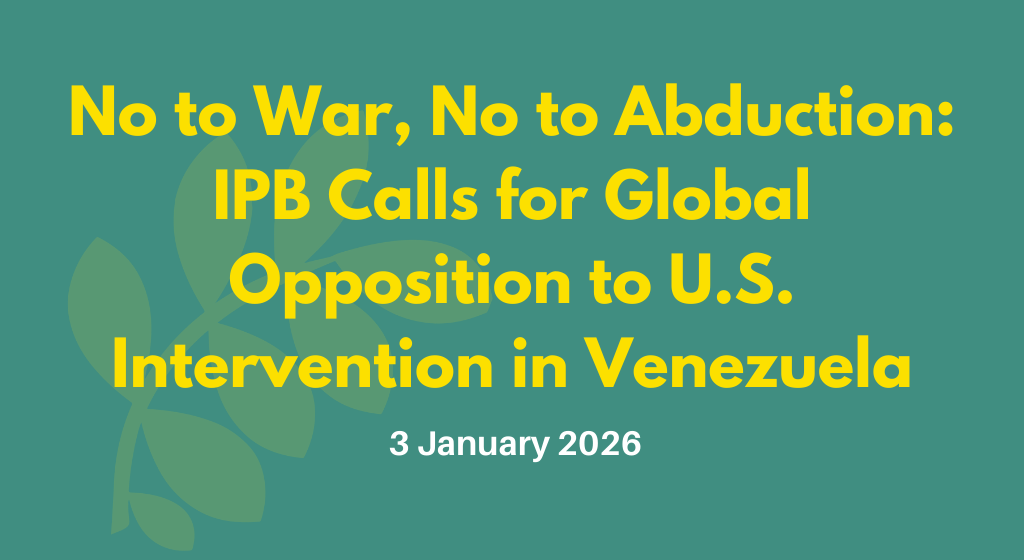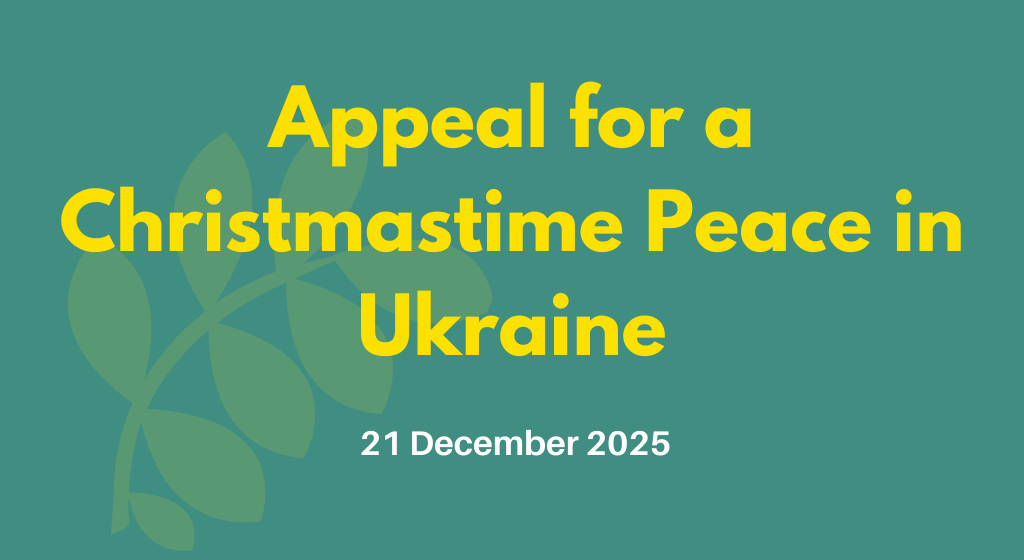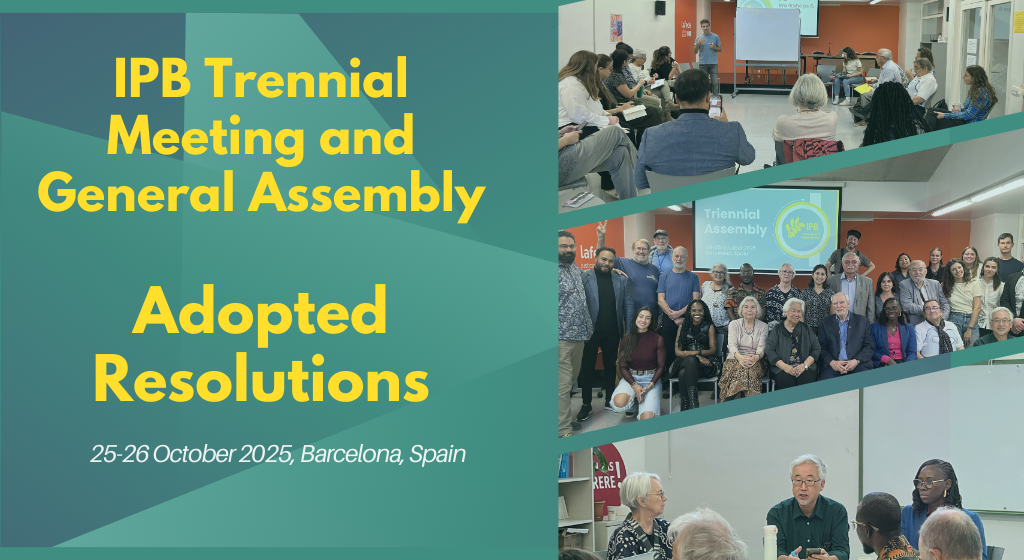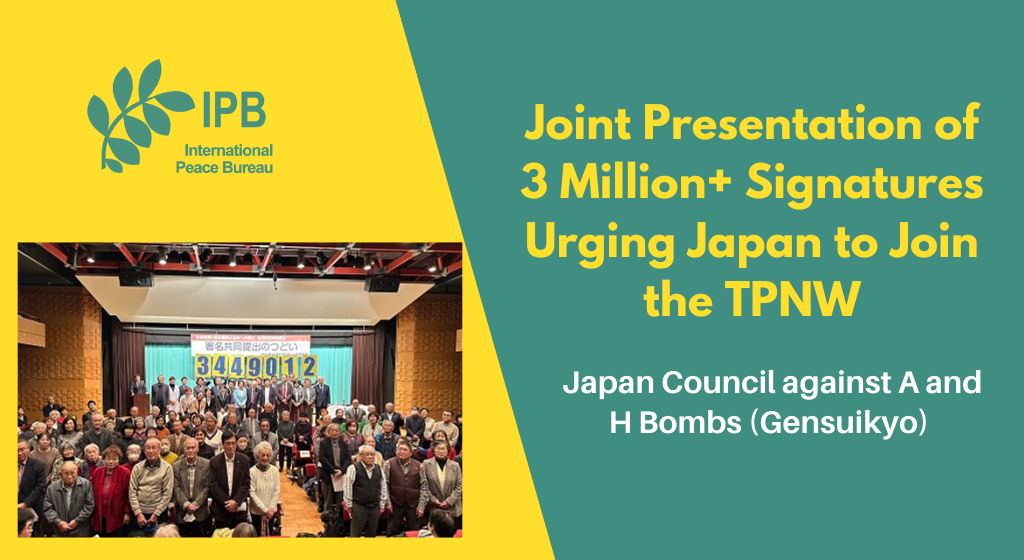Joseph Gerson is the co-president of International Peace Bureau and President of the Campaign for Peace, Disarmament and Common Security. His books include With Hiroshima Eyes: Atomic War, Nuclear Extortion and Moral Imagination and Empire and the Bomb: How the U.S. Uses Nuclear Weapons to Dominate the World.
Author: sean
Why ‘Common Security’ is good for business and global stability. Here’s why
By: Luc Triangle, General Secretary, International Trade Union Confederation (ITUC) at the World Economic Froum 2026
- The concept of Common Security is about addressing root causes of instability: poverty, environmental degradation, exclusion and erosion of trust.
- The approach is the cornerstone of sustainable, predictable and profitable global business.
- Such security is not an abstract vision – it is a necessary strategy for our collective future, and business must be part of the solution.
By any measure, the world is at a crossroads. Geopolitical conflicts are escalating, climate breakdown is accelerating, economic inequality is deepening, erosion of democracy is growing.
Continue reading “Why ‘Common Security’ is good for business and global stability. Here’s why”Greenland: Not for Sale (or Conquest)
Statement by the Campaign for Peace, Disarmament and Common Security, January 20, 2026.
The Campaign for Peace, Disarmament and Common Security opposes and condemns President Trump’s imperial and neocolonial campaign of coercion to seize Greenland, an integral domain of Denmark.
Trump’s ambitions for Greenland are part of the increased strategic and commercial competition for influence and potentially control of the Arctic and the northwest passage. Greenland’s mineral wealth, including rare earth minerals, has increasing economic importance.
Continue reading “Greenland: Not for Sale (or Conquest)”Appeal to the Presidents of the Russian Federation and the United States of America
On 5 February 2026, the last nuclear arms control treaty between the USA and Russian Federation, The United States of America and the Russian Federation on Measures for the Further Reduction and Limitation of Strategic Offensive Arms (New START), which has limited the nuclear arms race – albeit completely inadequately – will expire. There is a danger of an unrestrained arms race, including a nuclear arms race, with far-reaching political, strategic, economic and psychological consequences, leading to even greater confrontation and destabilisation of the already volatile international situation.
Continue reading “Appeal to the Presidents of the Russian Federation and the United States of America”Global Day of Action in Solidarity with Venezuela: January 17
No War, No Overthrow, No Coup, No Sanctions!
We are calling for an end to U.S. hostility toward Venezuela, including sanctions, threats, & war.
- End all war and hostilities toward Venezuela.
- Cut off the funding that allows such crimes.
- Free Venezuela’s kidnapped president.
- Bring all U.S. troops and equipment back to the United States from Venezuela and vicinity.
- Cancel the brutal economic sanctions, naval blockade, and no-fly-zone.
- Renounce overthrows and the Monroe Doctrine.
- Impeach, convict, and remove President Trump from office.
Women As Agents of Change: Students of Serbia
Love is the quiet force that rebuilds what was broken. Unity is the light that guides us forward.
This is their story…
From Serbia to the world, a new vision and frequency moves through the youth, one woven with hope, compassion, and unbreakable solidarity
At the forefront of this rising are the women, whose voices, resilience, and leadership have set the tone for a new era of courage.
They show us that even in the darkest chapters of humanity, the light returns through those willing to stand together.
A reminder that humanity’s greatest revolutions begin with love and what becomes possible when we stand as ONE.
This is The Students of Serbia.
Continue reading “Women As Agents of Change: Students of Serbia”No to War, No to Abduction: IPB Calls for Global Opposition to U.S. Intervention in Venezuela
The International Peace Bureau (IPB) firmly condemns the US military strikes in Venezuela, and the kidnapping of President Nicolas Maduro and his wife to stand trial in the US. This illegal act of war has already led to the death of civilians and military personnel alike and risks throwing both Venezuela and the wider Latin American and Caribbean region into greater instability and deeper conflict. Though the US claims that the military intervention is over, we must be wary of continued military and non-military intervention in Venezuela during this sensitive and volatile moment – as we have seen in past instances such as post-Gaddafi Libya, there is likely further instability to come.
Continue reading “No to War, No to Abduction: IPB Calls for Global Opposition to U.S. Intervention in Venezuela”Appeal for a Christmastime Peace in Ukraine
As Christmas approaches, the war in Ukraine is still ongoing after nearly four years, with countless lives lost, cities destroyed and grave consequences for the environment. Despite ongoing diplomatic efforts to resolve the war, there are still no signs of a breakthrough. Recent calls for a Christmas ceasefire from Zelenskyy and German Chancellor Friedrich Merz represent a renewed opportunity for an important first step towards peace – a new Christmas Ceasefire. Similar proposals have been made in past years, including by Russia in 2023, without success.
Continue reading “Appeal for a Christmastime Peace in Ukraine”Resolutions Adopted at the 2025 IPB Triennial Assembly
The weekend of October 25–26 IPB held its Triennial Assembly in Barcelona, the organization’s highest decision-making meeting. The event brought together 19 Board and Council members in person from the different regions in the world and 16 Board and Council members online, along with several individual members and external observers who joined both onsite and remotely—bringing the total to over 50 participants. Representatives of member organizations and partner networks engaged in formal and informal discussions, reviewed the progress made since the last Annual Council Meeting in 2024 and the last Triennial in 2022, and contributed to shaping IPB’s strategic direction for the coming years.
Read more: Resolutions Adopted at the 2025 IPB Triennial AssemblyThe outcome of such strategic conversations is reflected in the adopted resolutions, which will guide the work of our network moving forward.
- Global Governance in a Shifting Geopolitical Landscape
- The Importance of Cross-Movement Collaboration during Overlapping Crises
- The Urgency of Disarmament Revitalization
- Digitalizing IPB’s Data Management and Expanding Communication Platforms and Budget
- Consolidation of IPB Consultants into a Formal Advisory Group
The first three resolutions respond to the changes we are currently facing in the international sphere. An increasingly dangerous tendency towards rearmament and a disregard for international institutions and norms is making it more necessary than ever to reflect on where we stand as a network committed to peace and justice. We renew and reaffirm our stance against militarism and in defense of social justice and environmental protection.
The last two resolutions are enablers for the sustainability and improvement of the work we do, indispensable to keep the IPB network active and growing.
Translations of the resolutions into different languages will be available shortly on this page.
Resolutions
1. Global Governance Reform in a Shifting Geopolitical Landscape
At a time when structural flaws are visible in the UN system, and the legitimacy of its institutions is growing fragile, IPB sees opportunities for global governance reform.
In doing so, we commit ourselves to advocating for the Pact for the Future, to supporting efforts to internationalise the UN Headquarters and meetings, and for greater inclusion of civil society and regional networks within the UN framework. Through developing partnerships, coalitions, and networks, we will support UN treaties and oppose efforts to weaken or delegitimise the UN.
2. Building a Common Movement through Cross-Movement Collaboration during Overlapping Crises
3. The Urgency of Disarmament Revitalization
4. Digitalizing IPB’s Data Management and Expanding Communication Platforms and Budget
5. Development of an Advisory Group
Joint Presentation of 3 Million+ Signatures Urging Japan to Join the TPNW
3,449,012 Signatures Collected and Jointly Presented to Government
Urging Japan to Join the TPNW
Japan Council against A and H Bombs (Gensuikyo)
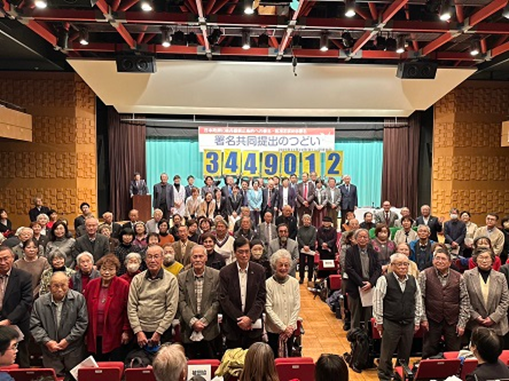
On November 21, responding to the call of Nihon Hidankyo, the joint presentation of signatures on the petition: “We Call on the Government of Japan, the Only A-bombed Country in Wartime, to Sign and Ratify the Treaty on the Prohibition of Nuclear Weapons” was held in Tokyo. This was the first joint action where Hidankyo (Japan Confederation of A-and H-Bomb Sufferers Organizations), Gensuikyo (Japan Council against A and H Bombs) and Gensuikin (Japan Congress Against A and H Bombs) coordinated, since the three organizations issued a joint appeal on July 23: “On the Occasion of the 80th Anniversary of the Atomic Bombing: We Call for Nationwide Efforts to Inherit and Spread the Reality and Experiences of Hiroshima and Nagasaki.”
Continue reading “Joint Presentation of 3 Million+ Signatures Urging Japan to Join the TPNW”
